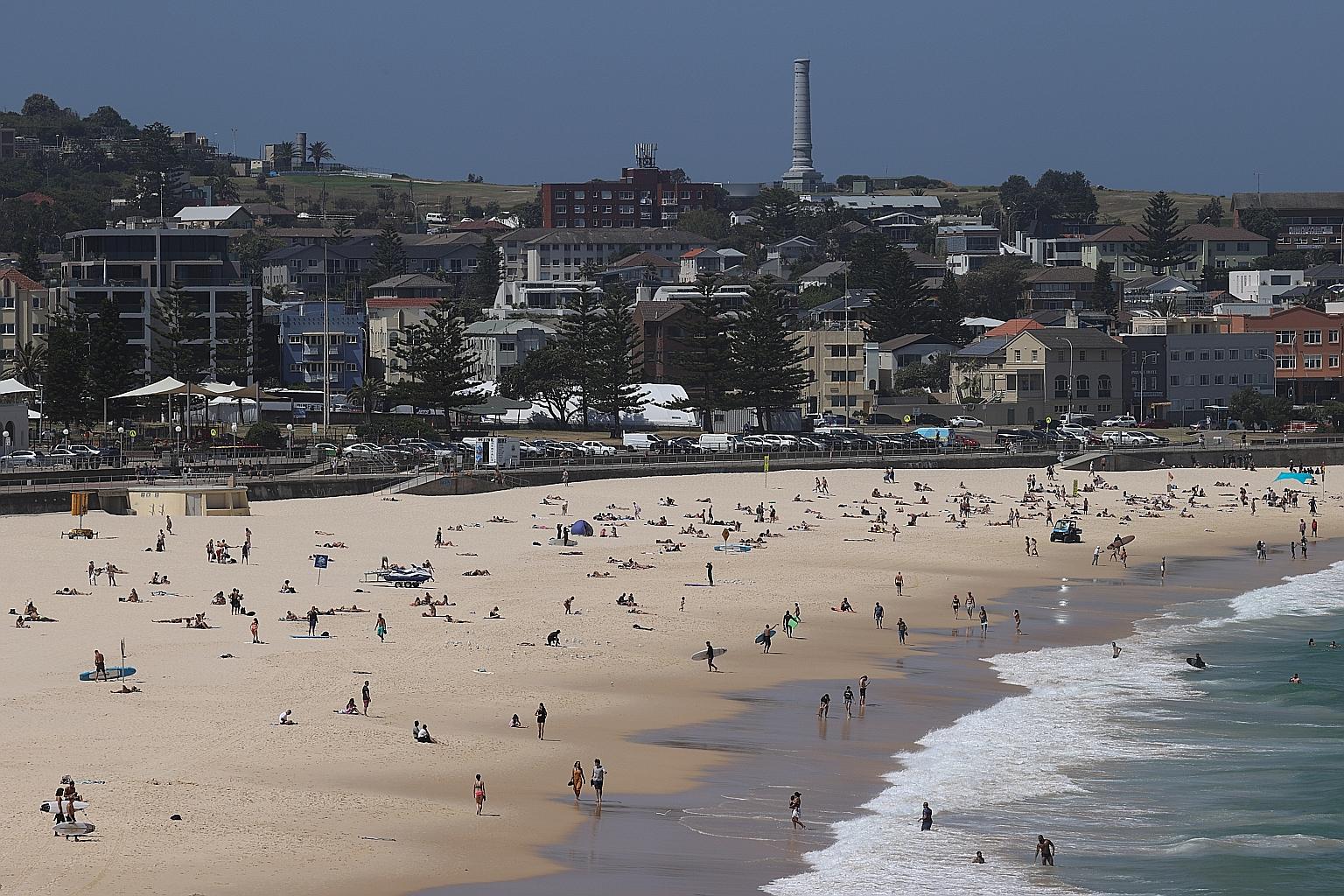Bondi beats Bali as grounded Aussies holiday at home
Sign up now: Get ST's newsletters delivered to your inbox

Bondi Beach in Sydney, Australia. The country's economic recovery is poised to accelerate amid a spending surge by Australians looking to holiday in the country.
PHOTO: REUTERS
Follow topic:
SYDNEY • As Covid-19 restrictions blanket much of Europe and infections continue to climb in the United States, Australia is experiencing the biggest holiday boom in half a century after virtually eliminating the virus.
With the international border closed, globe-trotting Australians who normally head overseas to Aspen or Phuket at this time of the year are being forced to vacation at home.
It has brought a blast in domestic consumption, helping lift the nation out of recession as Australia's long, hot summer kicks off and the population roams its vast backyard.
That spending surge is set to continue as households that hoarded cash throughout the pandemic hit the bitumen and recreate the long trips that defined vacations in the post-war decades.
Among them is Sydneysider Brian Gibbons, who was forced to cancel a five-week trip back to Ireland in April. Instead, he spent close to A$4,000 (S$4,035) on camping gear for a family holiday closer to home. "You name it, we bought it," Mr Gibbons said.
Amid the exodus from Melbourne, Sydney and other major cities for summer breaks, rental rates are soaring for the few beachside holiday homes still vacant.
Retailers say sales of camper vans, vehicle accessories, roof racks and bike carriers are booming.
To be sure, the closed international border has robbed Australia of the dollars of overseas tourists - a record 9.3 million people visited in the financial year before the coronavirus broke out, government data shows.
But, with Australians typically spending more overseas than international visitors spend in the nation, the net benefit for the domestic tourism industry could be as much as A$19 billion.
ROAD TRIP
In a normal year, retiree Peter Chandler and his wife would take two trips from Perth, Western Australia, to the northern hemisphere.
In March, they had to abort a cruise off Brazil's northern coast as Covid-19 started to spread worldwide. Now, Mr Chandler is pouring his holiday money into Australia.
Two months ago, the 67-year-old spent A$37,000 on a second-hand Mitsubishi Pajero sport utility vehicle and the couple are planning a two-week caravaning trip through south-western Australia next month.
He has no plans to travel farther than New Zealand until he is vaccinated. "I would love to go to Bali, but there's just no way in the world I would go near the place."
This redirection of tourism dollars is a bonanza for some investors too.
Shares of Super Retail Group, the fishing-and-camping superstore owner, and Bapcor, which runs Autobarn car-accessory outlets, have more than doubled since March.
The stock price of ARB, which specialises in equipment for off-road vehicles, has almost tripled. Together, they have added more than A$4.4 billion of market value.
The scale of the boom surprised Bapcor chief executive Darryl Abotomey, who said roof-rack sales have doubled this year and demand for road-trip essentials such as in-car entertainment systems is soaring.
He reckons demand will continue for the next few years as first-timers get a taste for the road trips of yesteryear.
"We thought we might have a good month or two, but it's continued," he said. "I remember when I was a kid, my parents used to chuck me in the back of the station wagon, stick the caravan on the back and you'd go wherever. That seems to be what people are starting to do."
SPENDING SPREE
Mr Andy Shen, general manager of Melbourne-based online bicycle store Cycling Deal, is struggling to keep pace with demand for bikes, tools, car racks and towing devices.
"Some of the new stock has arrived, but it's still not enough," he said.
Domestic travel has gradually increased as states and territories eased internal border restrictions aimed at stopping the spread of the virus. And since Queensland opened its border to New South Wales and Victoria early this month, it has exploded.
There has been minimal community transmission nationwide since Melbourne emerged from a three-month lockdown in late October.
Other nations that have controlled the virus are seeing a similar increase in travel. In China, air passenger traffic is almost back to normal.
But the booming demand may see some would-be holidaymakers disappointed. At beaches three hours' drive south of Sydney, there is almost no holiday accommodation left.
McKay's Oysters, farther south in Pambula, is scrambling to keep up with a 200 per cent jump in demand.
"Normally before Christmas, we have a quiet period because everyone is saving up for his or her Christmas presents. But because everyone is having a Covid-19 holiday, we're getting hammered," said owner John McKay, who has been running his business for the past 30 years.
All 63 vacation homes managed by Jervis Bay Rentals are booked until the end of next month, and nightly rates are up 30 per cent to 40 per cent, said owner Peter Atkins.
Families are more than willing to spend A$10,000 a week for a home and even more for a luxurious property, he said. "That's your Aspen trippers," he added. "We're flat out."
BLOOMBERG

